|
|
|
Sort Order |
|
|
|
Items / Page
|
|
|
|
|
|
|
| Srl | Item |
| 1 |
ID:
178247
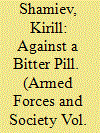

|
|
|
|
|
| Summary/Abstract |
From 2007 to 2012, Russian armed forces faced unprecedented changes that affected their structural, economic, social, and ideological elements. However, not all aims were fulfilled, and some changes were rolled back, despite the political and financial support from Vladimir Putin and Dmitry Medvedev for the defense minister Anatoly Serdyukov. Using the data from 11 interviews with former high-ranking military officers, scholars, and insider press workers, the research shows that the unsustainability of the reform was caused by the radicality of changes, the interest groups influence, and the technocratic policymaking in nondemocratic Russia. In addition, the research demonstrates the strategies the reformers used in order to overcome the resistance from mobilized interest groups. They had not succeeded, that ultimately led to the resignation of the defense minister, which stopped further radical changes in the contemporary Russian armed forces.
|
|
|
|
|
|
|
|
|
|
|
|
|
|
|
|
| 2 |
ID:
037104
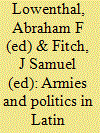

|
|
|
|
|
| Edition |
rev ed
|
| Publication |
New York, Holmes and Meier Publishers, 1968.
|
| Description |
iii, 480p.
|
| Standard Number |
084190913X
|
|
|
|
|
|
|
|
|
|
|
|
Copies: C:1/I:0,R:0,Q:0
Circulation
| Accession# | Call# | Current Location | Status | Policy | Location |
| 029221 | 322.5098/LOW 029221 | Main | On Shelf | General | |
|
|
|
|
| 3 |
ID:
146885
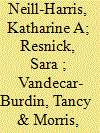

|
|
|
|
|
| Summary/Abstract |
This study examines partnerships between the military and local communities by exploring communication channels of the U.S. military and civilian agencies that provide services to transitioning military members. This article reports on a study conducted in 2013 in the Hampton Roads, Virginia area, designed to determine the degree to which the military enters into partnerships with civilian service providers. We find that navy agencies in Hampton Roads do work with community partners, but the military is more directive than one might imagine in a true partnership, leading to “uneasy” partnerships. Additionally, there are important structural and organizational barriers that prevent true partnerships from developing between navy agencies and the community providers.
|
|
|
|
|
|
|
|
|
|
|
|
|
|
|
|
| 4 |
ID:
183839
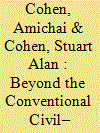

|
|
|
|
|
| Summary/Abstract |
This article modifies the framework for the analysis of civil–military “gaps” proposed in Armed Forces & Society (Vol. 38, 2012) by Rahbek-Clemmensen, Archer, Barr, Belkin, Guerro, Hall, and Swain, who depicted a continuum of four binary fissures (“gap dimensions”) dividing two hypothetically homogeneous communities: civilians versus military personnel. Extrapolating from Israel’s experience, this article instead visualizes a more dynamic and fissured landscape, inhabited by several heterogeneous clusters of population groups, each comprising impromptu coalitions drawn from both the armed forces and civilian society. That environment, we argue, although certainly influenced by the traditional penetrability of Israel’s civil–military boundaries, more directly reflects current technological and cultural processes, which are transforming encounters between civilians and military personnel in other countries too. We therefore suggest replacing the predominantly dichotomous taxonomies that generally characterize studies of civil–military relations in contemporary democratic societies with the fractured format observed in the Israeli case.
|
|
|
|
|
|
|
|
|
|
|
|
|
|
|
|
| 5 |
ID:
102171
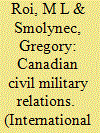

|
|
|
| 6 |
ID:
034808
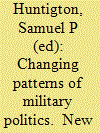

|
|
|
|
|
| Publication |
New York, Free Press, 1962.
|
| Description |
272p.
|
| Series |
International yearbook of political behaviour research; v. 3
|
|
|
|
|
|
|
|
|
|
|
|
Copies: C:1/I:0,R:0,Q:0
Circulation
| Accession# | Call# | Current Location | Status | Policy | Location |
| 000044 | 322.5/HUN 000044 | Main | On Shelf | General | |
|
|
|
|
| 7 |
ID:
025100


|
|
|
|
|
| Publication |
Washington, D.C, American Enterprise Institute for Public Policy Research, 1977.
|
| Description |
84p.
|
| Standard Number |
0844732389
|
|
|
|
|
|
|
|
|
|
|
|
Copies: C:1/I:0,R:0,Q:0
Circulation
| Accession# | Call# | Current Location | Status | Policy | Location |
| 017017 | 322.5/GOO 017017 | Main | On Shelf | General | |
|
|
|
|
| 8 |
ID:
088937
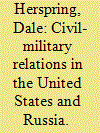

|
|
|
|
|
| Publication |
2009.
|
| Summary/Abstract |
The key to understanding civil-military relations in polities such as Russia and the United States is military culture. Military culture includes a variety of characteristics or norms of behavior. Some such as executive leadership, respect for military expertise, and a clear chain of command are critical and exist in both the American and Russian militaries. Looking at two periods in both countries (Yeltsin and George Bush II, and Putin and George Bush I), this article maintains that in those instances when military culture was ignored in either country (e.g., a lack of executive leadership, little respect for military expertise, and lack of a clear chain of command), conflict not only existed but also was acerbated. Conversely, in cases where the civilians were firmly in charge but respected military culture, conflict was minimized. Senior military officers felt free to express their opinions and had the perception that their views were always taken seriously.
|
|
|
|
|
|
|
|
|
|
|
|
|
|
|
|
| 9 |
ID:
176575
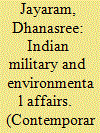

|
|
|
|
|
| Summary/Abstract |
In India, issues related to environmental governance have not been aligned to the military’s objectives except in a few cases. Since environmental change has not been recognised as a critical 'security' issue yet in India, there is a reluctance on the part of the security establishment, including the military, to deal with it on an urgent basis. The question of why the armed forces should be trained to undertake environmental activities when their primary duty is to defend the country against external aggression assumes significance as it is largely believed that if they are trained for the former, their primary functions could suffer and territorial integrity of the nation could be threatened. Other impediments to institutionalisation include the complex relations between the civil and military establishments; constitutional and legal status of the Indian armed forces that is not uniformly enshrined or recognised; and their societal status that still comes under constant scrutiny, leading to a wedge between the military and civilian domains. In this context, the article attempts to identify the doctrinal and policy dimensions of the Indian military’s role in environmental affairs as well as the factors that influence formal institutionalisation.
|
|
|
|
|
|
|
|
|
|
|
|
|
|
|
|
| 10 |
ID:
125233
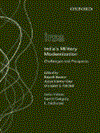

|
|
|
|
|
| Publication |
New Delhi, Oxford University Press, 2014.
|
| Description |
xvi, 311p.Hbk
|
| Series |
Oxford International Relations in South Asia Series
|
| Standard Number |
9780198092384
|
|
|
|
|
|
|
|
|
|
|
|
Copies: C:1/I:0,R:0,Q:0
Circulation
| Accession# | Call# | Current Location | Status | Policy | Location |
| 057491 | 355.00954/BAS 057491 | Main | On Shelf | General | |
|
|
|
|
| 11 |
ID:
169098
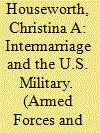

|
|
|
|
|
| Summary/Abstract |
This article uses a comprehensive descriptive analysis to examine the determinants of racial intermarriage for native-born men and women using the 2012 American Community Survey. A comparison between military and civilian samples is the main focus of the article. We improve upon the existing literature by identifying the proximity of the respondent’s current residence to a military base and including an analysis of anti-miscegenation laws by state. Further, we provide a cohort analysis to parse out generational differences. We find that military members are more likely to intermarry, regardless of cohort, and that non-White military members have higher rates of education than their civilian counterparts. Black females in the military are more educated and have a significantly higher rate of intermarriage than their civilian counterparts. Additionally, the difference in intermarriage rates between civilian and military members is 31 percentage points higher for Black women than Black men.
|
|
|
|
|
|
|
|
|
|
|
|
|
|
|
|
| 12 |
ID:
182689
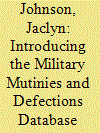

|
|
|
|
|
| Summary/Abstract |
Military mutinies are critical to scholars’ collective understanding of civil–military relations. This article introduces a new dataset that systematically codes mutinies across all regions and conducts an exploratory analysis of these new data. The primary contribution made here is the introduction of a new dataset that provides scholars with a sample of mutinies across region, space, and time. The new Military Mutinies and Defections Database (MMDD) codes events of military indiscipline from 1945 to 2017. This dataset uses geocoding techniques that will enable scholars to explore the spatial patterns and diffusion associated with mutinies. The second contribution is the preliminary exploration of these new data. Of note, I demonstrate that over one-third of all mutinies are violent, 6% of mutinies are associated with civilian deaths, and anocracies are more likely to experience mutinies than democratic or autocratic counterparts. MMDD provides investigators with an exciting new tool to explore dimensions of military disloyalty.
|
|
|
|
|
|
|
|
|
|
|
|
|
|
|
|
| 13 |
ID:
154420


|
|
|
| 14 |
ID:
185516
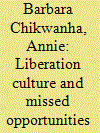

|
|
|
|
|
| Summary/Abstract |
This article analyses the roles of key liberation war actors in shaping the new security regime in Zimbabwe. This is done through analysing the trajectory of the security sector reforms (SSR) and the missed opportunities for transformation since 1980. The post 1980 security establishment was dominated by the logistical posturing of the liberation war security structures. This allowed for the infusion of the exile formed liberation culture values that evolved during war-time governance practices. SSR in the country remained deliberately skewed towards technical capacity building, without attempts to align the security provision with the universal human rights doctrine. The findings show that the partisan oriented SSR approach has contributed to the elusive human security paradigm in the country.
|
|
|
|
|
|
|
|
|
|
|
|
|
|
|
|
| 15 |
ID:
109044
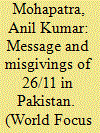

|
|
|
| 16 |
ID:
099040
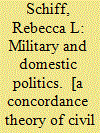

|
|
|
|
|
| Publication |
London, Routledge, 2009.
|
| Description |
x, 173p.
|
| Series |
Case military studies
|
| Standard Number |
978041577409, hbk
|
|
|
|
|
|
|
|
|
|
|
|
Copies: C:1/I:0,R:0,Q:0
Circulation
| Accession# | Call# | Current Location | Status | Policy | Location |
| 055289 | 322.501/SCH 055289 | Main | On Shelf | General | |
|
|
|
|
| 17 |
ID:
139901
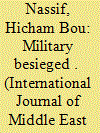

|
|
|
|
|
| Summary/Abstract |
This article draws on extensive fieldwork and original data to trace the transformation of civil–military relations in Tunisia during the tenure of the former president Zayn al-ʿAbidin bin ʿAli (1987–2011). The republican ethos of the Tunisian Armed Forces (al-Quwwat al-Musallaha al-Tunusiyya) is often stressed to explain its traditional political quiescence. However, I maintain that it was the active hostility of the military's rivals within the Bin ʿAli regime that prevented Tunisian generals from playing a greater role in their country's public life. I disaggregate Bin ʿAli's regime into its fundamental institutional components—namely, the presidency, the party, the police, and the military—and investigate rivalries and alliances that structured the struggle for influence and power between Bin ʿAli's rise to the presidency and his downfall. I argue that there is a direct and causal relationship between the 2010–11 uprising and inter- and intrainstitutional dynamics within the regime. In other words, the study of contemporary Tunisian civil–military relations is critical to understanding the breakdown of the Bin ʿAli regime.
|
|
|
|
|
|
|
|
|
|
|
|
|
|
|
|
| 18 |
ID:
094815


|
|
|
|
|
| Publication |
2010.
|
| Summary/Abstract |
Although Israel constitutes an interesting case for the study of civil-military relations, the role played by its Directory of Military Intelligence (AMAN) has rarely been discussed in this context. This role is of special interest, since Israel is the only liberal democracy today in which a military intelligence service functions as the leading national estimator not only in military but also in civilian affairs. The unique Israeli model is usually justified by Israel's security concerns-primarily the threat of a sudden conventional attack. To test this model's validity, this article (1) traces and elucidates its historical development; (2) employs five crucial mini case studies to test its practical success or failure; and (3) explains how, in light of the fact that AMAN failed in four of the five cases, its military characteristics create inherent weaknesses that hamper its ability to serve as a high-quality national intelligence estimator.
|
|
|
|
|
|
|
|
|
|
|
|
|
|
|
|
| 19 |
ID:
091369
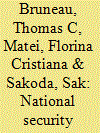

|
|
|
| 20 |
ID:
163577
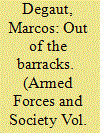

|
|
|
|
|
| Summary/Abstract |
Why some democratic revolutions succeed while others fail? The scholarly community has sought to address this issue from various perspectives, from rational choice approaches to collective action theories. Too little attention, however, has been paid to analyzing the role of the military. By discussing the different types of interactions played by the military in five cases of successful democratic revolutions—the 1910 Portuguese Republican Revolution, the 1958 Venezuelan Revolution, the 1960 April Revolution in South Korea, the 1989 Velvet Revolution in Czechoslovakia, and the 2000 Bulldozer Revolution in Yugoslavia—and three cases of failed revolutions, the 1905 bourgeois-liberal revolution in Russia, the 1989 Tiananmen Square Protests in China, and the 2016 Turkey’s coup attempt, this study finds out that the key factor in determining their outcome is the army’s response and that the military backing is a necessary condition for a democratic revolution to succeed.
|
|
|
|
|
|
|
|
|
|
|
|
|
|
|
|
|
|
|
|
|